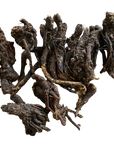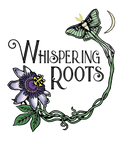




Osha Root
Botanical Name: Ligusticum porteri
Sustainably Wildharvested
Note: This Osha root is ethically & sustainably wildharvested to protect the plant population of this very important and Sacred root. The roots are harvested by a Medicine man in a Sacred way beginning with an offering...always asking first for permission from Great Spirit, the Spirit of the plant, the land and the Spirits who dwell and protect that land. The entire harvest is spent in prayer and followed by a blessing.*
Indigenous tribes have used the medicine of Osha for respiratory illness, as an aid for coughs, pneumonia, colds, bronchitis, and the flu.* Its analgesic properties may help support a sore throat and antimicrobial effects may help protect against infection.*
Unfortunately there are very little research studies to support these claims.
*These statements have not been evaluated by the FDA. This product is not intended to diagnose, treat, cure or prevent any disease.





